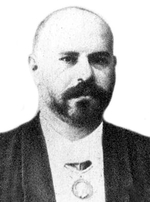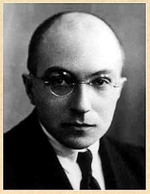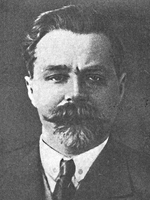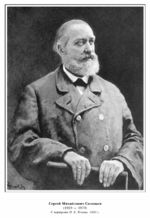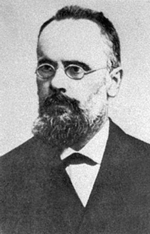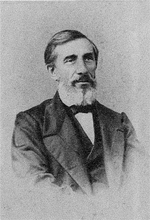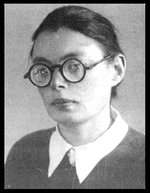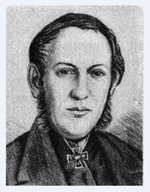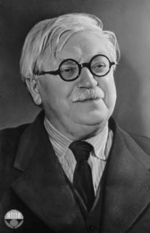Articles
Sokolov Ivan (1865–1939)
Sokolov Ivan (1865–1939) – Byzantinist, historian of the Church.
After graduating from the Saratov Theological School (1880), he entered the Saratov Theological Seminary. In 1886-1890, he studied at the Kazan Theological Academy. From 1891 to 1893, he taught at the Saratov Theological Seminary. In 1894, he got Master degree in Theology for his work ‘The State of Monasticism in the Byzantine Church from the Mid-Ninth to the Early Thirteenth Century. (842–1204)’ (Prize of Metropolitan Macarius, 1896). In 1894, he was admitted to the service at the St. Petersburg Theological Seminary (until 1903) as a teacher of the Ancient Greek language. From 1903, Ass. Professor of the Department of the Greek-Eastern Church of the St. Petersburg Theological Academy.
Read More
Sokolov Mikhail (1890–1937)
Sokolov Mikhail (1890–1937) – specialist in Semitic studies.
He was born in the family of a priest; he graduated from the Moscow Spiritual Seminary in 1910. In 1915, he graduated from the Moscow Spiritual Academy, and entered the Faculty of Oriental Languages of the Petrograd University; two years after he passed the course at the Hebrew-Syrian Sector and stayed for preparations for the Professor position. Since 1918, he taught Old Hebrew language (grammar) and reading of the Biblical text. He also taught students of other faculties of the Petrograd/Leningrad University, and worked as Researcher at the Research Institute of the Comparative History of Literatures and Languages of the West and East. He was also Secretary of the Collegium of Orientalists at eth Asian Museum; Head of the Hebrew Department of the Asian Museum.
Read More
Sokolov Yury (1889–1941)
Sokolov Yury (1889–1941) – folklorist, philologist, ethnographer; twin-brother of Boris Matveevich Sokolov.
He learnt at the 10th Moscow Male Gymnasium; in 1906, together with brother, he enrolled to the Historical and Philological Faculty of the Moscow University. In 1908-1909, also with his brother, he went at the expedition to the Belozersky and Kirillovsky Districts of the Novgorod Region to collect folklore and ethnographical material. In 1911, he stayed at the Faculty to prepare himself for the Master exams and for his thesis. At the same time, he started to reach students.
Read More
Soloviev Sergey (1820–1879)
Soloviev Sergey (1820–1879) – historian, specialist in Russian history and culture.
He graduated from the Historical and Philological Department of the Philosophical Faculty of the Moscow University in 1842. In 1842-1844, he travelled abroad as a private teacher at the family of Count S. G. Stroganov; thanks to it S. had a chance to visit lectures at the Universities of Paris, Berlin, and Heidelberg.
In 1845, he defended his Master thesis ‘On the Relations of Novgorod and Moscow Great Princes’; in 1847, he defended his Doctor thesis ‘The History of Interrelations of Russian Princes of the House of Riurik’.
Read More
Spassky Anatoly (1866–1916)
Spassky Anatoly (1866–1916) – ecclesiastic historian, medievalist.
His main works were on the sources for the history of Early Christian Church. He graduated from the Moscow Spiritual Academy; he was disciple of A. P. Lebedev. In 1896, he defended his Master thesis ‘The Historical Destiny of the Composition of Apollinaris of Laodicea, with a Short Introductory Essay on His Life’ (Sergiev Posad, 1895); he reattributed some texts which had been assigned to Apollinaris of Laodicea before. He taught at the Moscow Spiritual Academy: at first, at the Chair of the New Civic History, where he made lectures in the medieval history; since 1895, he was transferred to the Chair of the General Ecclesiastic History.
Read More
Sreznevsky Ismail (1812–1880)
Sreznevsky Ismail (1812–1880) – philologist, specialist in Slavic studies, ethnographer, paleographer.
In 1826, he enrolled to the Kharkov University; in 1829, he got the Candidate degree; in 1837, he defended his Master thesis ‘An Etude on the Essence and Content of the Theory in the Political Disciplines’ (Kharkov, 1837). Adjunct at the Chair of Political Economy and Statistics at the Kharkov University (1837).
His amateur interest to ethnography and folklore was getting more and more professional. In 1839, he went to the South-Western Europe and spent three years there, studying folklore, life and popular religious beliefs of Slavs; and he sent regular reports and travel notes to Russian and European magazines.
Read More
Starkova Claudia (1915–2000)
Starkova Claudia (1915–2000) – specialist in Hebrew studies, especially in the Qumran manuscripts.
In 1933, after a secondary school, she enrolled to the Faculty of Linguistic of the Leningrad Institute of Philosophy, Linguistic, and Literature, specializing there at the Chair of Semitic Languages and Literatures. After the graduation, she started her work over the Candidate thesis about the Hebrew poet and philosopher Judah Halevi (twelfth century) on the base of manuscripts from the State Public Library. She spent the first winter of the Blockade in Leningrad; since 1942 she was in evacuation in Tashkent.
Read More
Steblin-Kamensky Mikhail (1903–1981)
Steblin-Kamensky Mikhail (1903–1981) – philologist, specialist in the history of culture and religion of Scandinavia.
In 1927, he passed the courses of English and taught at the Polytechnic Institute. Later, he graduated from the Philological faculty of the University by correspondence and entered the post-graduate courses of the Institute of Russian Literature of the Ac. of Sc. (Pushkinsky Dom).
In 1943, he defended his Candidate thesis ‘On the Issue of Evolution of the Old English Poetic Style (Substantive Epithet in the Old English Poetry)’; and in 1948 – the Doctor thesis ‘Scaldic Poetry’. Since 1950, he was Head of the Chair of the German Philology of the Leningrad State University.
Read More
Stroev Pavel (1796–1876)
Stroev Pavel (1796–1876) – historian, archeographer, and bibliographer.
He studied at the Department of Slavic Studies of the Moscow University (1813-1816). In 1816, not finishing the course, he entered to service at the Archive of the Ministry of Foreign Affairs; there he participated in the publication ‘The Collection of State Charters and Agreements’. He visited monasteries of the Moscow Regionin search for ancient manuscripts. He found ‘Izbornik’ of Svytoslab 1973, ‘Semon on Law and Grace’ by Metropolitan Hilarion (11th cent.), compositions by Cyril of Turovsk (12th cent.), Law Code of Great Prince Ivan III (1479) and others.
Read More
Struve Vasily (1889–1965)
Struve Vasily (1889–1965) – orientalist: specialist in Egyptology and Assyriology, historian of the Ancient World.
In 1907-1912, he studied at the Historical Department of the Historical and Philological Faculty of the St. Petersburg University, under the supervision of B. A. Turaev; there he studied classical languages and Egyptology. In 1912, he stayed at the University to prepare himself for the professor position. In 1913-1914, he was in Berlin, at the Egyptologist A. Erman. In 1915-1920, he was Ass. Docent, since 1920 – Professor of the Petrograd/Leningrad University. In 1918-1933, he was head of the Department of the Ancient East at the Hermitage. Since 1919, he studied Semitic languages (Old Hebrew, Phoenician, Ugarit) at P. C. Kokovtsov.
Read More
Showing 291-300 of 351 items.

